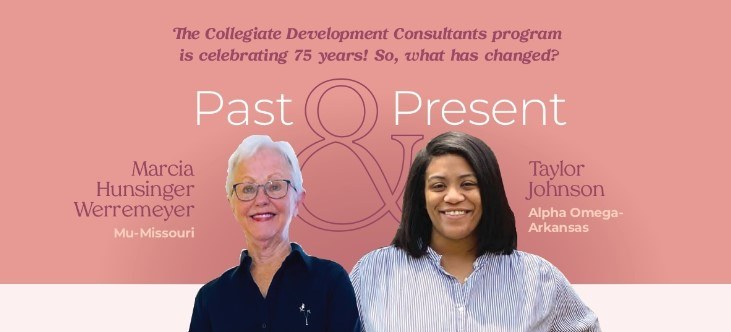Collegiate Development Consultants: Then and Now
Our Collegiate Development Consultant (CDC) program celebrates its 75th anniversary this year. So much has changed in the ways of technology and travel for these women but the fact remains: for 75 years, these women have been an integral part in the development and growth of our sisterhood.
Our 2020-2021 CDC team participated in interviews as normal in February 2020, just before the COVID-19 pandemic changed how the world could operate. In July, the consultants began training virtually, using Zoom for "face-to-face" meetings and finding ways to build camaraderie from afar. The fraternal world was changing rapidly to accommodate pandemic orders and keep members safe, which meant consultants had to quickly become experts in previously uncharted areas of fraternity/sorority life.
The 2020 CDCs have been able to support chapters with virtual recruitment, socially-distanced sisterhood events, and balancing all of the demands on collegians' time (and internet connection). Many 'visits' have been entirely virtual, but some consultants have traveled to the location of our newest chapters to stay for the semester. Despite so much change, the ultimate goal remains the same: support chapter operations, develop the confidence and leadership skills of collegiate officers, and empower Delta Gammas everywhere to live our values and do good.
In the Fall 2020 ANCHORA, we featured the 2020-2021 CDC team and a spotlight on how the job has evolved over its 75 years. In our "Past & Present" story, we talked to current CDC Taylor Johnson, Alpha Omega-Arkansas, and 1970-1971 field secretary Marcia Hunsinger Werremeyer, Mu-Missouri, to get an inside look at the similarities and differences of the role.

What year were you a CDC?
Taylor Johnson: 2019-2020; and I am currently a second-year consultant on the 2020-2021 team
Marcia Hunsinger Werremeyer: 1970-1971
What were the main responsibilities of a CDC?
TJ: Providing consultation and support to collegiate chapters through leadership development, education and guidance. CDCs collaborate with collegiate members, advisers, volunteers, university administrators, and fellow EO staff in their effort to assist chapters in reaching their fullest potential.
MHW: We served as a liaison between EO/Council/Cabinet and collegiate chapters and universities. We problem solved with collegians and reported back to Columbus.
How long was your training?
TJ: A month
MHW: A week or so
What were the main focuses of the training?
TJ: Training begins with an introduction to all departments at EO, who will be integral in assisting us as we work remotely with collegiate chapters, and learning all areas of collegiate chapter functions. Other focuses include recruitment (and retention), as well as sessions to further foster our leadership abilities and knowledge to prepare us to collaborate with guide collegiate chapters.
MHW: Learning best practices, familiarity with CCOM, policies and procedures. There were four of us who came from a variety of DG backgrounds so all needed to be competent in all areas.
What was the best part about being a CDC?
TJ: The best part of being a CDC is working alongside and meeting so many amazing, passionate, and dedicated sisters and friends of the anchor. Oh, and having the opportunity to visit so many new and unique places while do so isn’t bad either!
MHW: Traveling and meeting young women from across North America. While each chapter had its own personality, they all shared similar problems and concerns. Working with involved alumnae set a great example for DG life after college.
What was the hardest part about being a CDC?
TJ: For being a job that involves being constantly surrounded by new people, it can be quite lonesome. As a traveling consultant working with chapters for short periods of time back-to-back I have found that, at times, I have to remind myself to leave time to turn my focus away from work and catch up with friends and family.
MHW: Since we had no means of communication other than letters and long-distance calls, we were pretty much out of touch with our individual friends. It was lonely at times.
What is a travel hack you learned as a CDC?
TJ: TSA precheck and a steamer can and will save your life and/or utilizing Marie Kondo's folding techniques can assist in taking full advantage of space in a suitcase.
MHW: No luggage with wheels in those days so we packed as lightly as possible. Rolling clothes rather than folding minimized the wrinkles.
How many chapters did you visit?
TJ: Last year, I visited 17 chapters in-person and three chapters virtually
MHW: 26?
During those visits, what was the consistent thing that you were really working with chapters?
TJ: Branding, especially the importance social media plays in chapter branding. Anchorbase was also something I regularly worked on with chapter officers.
MHW: How to make sorority life relevant in the lives of collegiate women, [problem solving related to] drugs, uninspired programming, too few women running for chapter offices, ineffective college Panhellenic, recruitment numbers down resulting in unfilled chapter houses and unbalanced budgets were all common areas of concern. (Keep in mind the historical climate: Vietnam War, Kent State shooting, assassinations of Robert Kennedy and Martin Luther King Jr., civil rights, first Earth Day, women's lib, walk on the moon and Woodstock)
We hope you've enjoyed this journey through the last 75 years of the CDC program! You can find blog posts about past decades on the blog homepage, and follow our CDC Instagram account, @deltagammacdcs. If you have questions about the Collegiate Development Consultant program today, email CDCapplications@deltagamma.org.
Applications for the 2021-2022 CDC team are now open! Learn more and apply on our jobs page, and register here for an information session about applying to be a CDC.
~~~~
Today, the Delta Gamma Foundation proudly funds training and programming opportunities through generous gifts to the Foundation, in the areas of social responsibility, health and well-being, and leadership. This includes the Collegiate Development Consultant Program, which is funded in part by the Delta Gamma Foundation!
